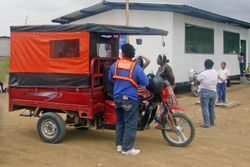Engineering:Shared transport
This article appears to contradict the article Public transport. (January 2018) (Learn how and when to remove this template message) |
Shared transport is a term for describing a demand-driven vehicle-sharing arrangement, in which travelers share a vehicle either simultaneously (e.g. ride-sharing) or over time (e.g. carsharing or bike sharing), and in the process share the cost of the journey, thereby creating a hybrid between private vehicle use and mass or public transport.
Shared transport systems include carsharing (also called car clubs in the UK), bicycle sharing (also known as PBS or Public Bicycle Systems), carpools and vanpools (aka ride-sharing or lift-sharing), real-time ridesharing, slugging, casual carpooling, community buses and vans, demand responsive transit (DRT), paratransit, a range of taxi projects and even hitchhiking and its numerous variants.[1][2]
Shared transport is taking on increasing importance as a key strategy for reducing greenhouse gas and other emissions from the transport sector in the face of the global climate emergency by finding ways of getting more intensive use of vehicles on the road.[citation needed]
A somewhat different form of shared transport is the "shared taxi", a vehicle which follows a predetermined route and takes anybody waiting for it, more like a bus than a taxi.
Shared transport modes
- Bicycle sharing system
- Carpooling
- Carsharing
- Demand responsive transport
- Real-time ridesharing
- Flexible Carpooling
- Green travel
- Hail and ride
- High-occupancy vehicle lanes
- Hitchhiking
- Paratransit
- Public space
- Remote Office Centers
- Ride-sharing
- Share taxi
- Slugging
- Sustainable transport
- The commons
- Truck sharing
- Vanpooling
Auto rickshaws

Auto rickshaws carry people and goods in many developing countries. Also known as a three-wheeler, Samosa, tempo, tuk-tuk, trishaw, auto, rickshaw, autorick, bajaj, rick, tricycle, mototaxi, baby taxi or lapa in popular parlance, they are motorized version of the traditional pulled rickshaw or cycle rickshaw. They are an essential form of urban transport, both as vehicles for hire and for private use, in many developing countries, and a form of novelty transport in many Eastern countries.
Notes and references
- ↑ Eisenberg, Anne (2008-12-21). "New York Times article". The New York Times. https://www.nytimes.com/2008/12/21/business/21novelties.html?_r=1. Retrieved 2009-05-21.
- ↑ "EcoPlan.org article". 2008. http://www.ecoplan.org/briefs/general/measures.htm. Retrieved 2009-06-24.
External links
- World Share/Transport Forum
- The Commons: Open Society Sustainability Initiative
- On the Commons
- The first World Share/Transport Forum convened in Kaohsiung in September 2010[yes|permanent dead link|dead link}}]
- Avego
